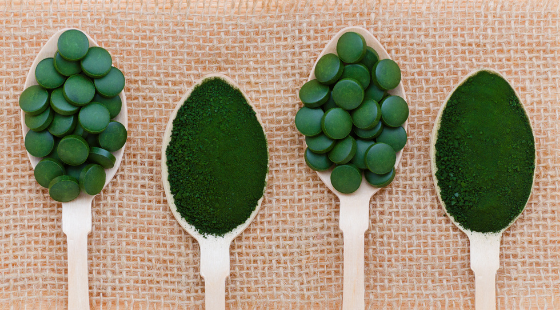
Chlorella is a type of algae that grows in fresh water. It has long been recognized as a superfood! There are over 30 different species, with the two most commonly researched being Chlorella vulgaris and Chlorella pyrenoidosa. Chlorella is typically sold in tablet form or as a powder in health food stores and supplement stores. Chlorella has a strong, earthy flavour that might be described as “green,” to put it nicely… but, the benefits are definitely worth the intense flavour! If you find you don’t enjoy the green taste, you may prefer taking it in tablet form, or mixing it in with fruits and vegetables in a smoothie.
Nutrients in Chlorella
Chlorella is a good source of protein, vitamin A, iron, and zinc. It is one of the few vegetarian foods sources that is a complete protein source, meaning it contains all 9 essential amino acids that we need to consume in our diets. A one-ounce (28g) serving of chlorella contains:
Calories: 115
Carbs: 6.5g
Protein: 16.4g
Fat: 2.6g
Fiber: 0.1g
Vitamin A: 14364 IU
Vitamin C: 2.9mg
Thiamin: 0.5mg
Riboflavin: 1.2mg
Niacin: 6.7mg
Vitamin B6: 0.4mg
Iron: 36.4mg
Magnesium: 88.2mg
Health Benefits of Chlorella
- Detoxification: Chlorella is great to consume during detox, as it can bind to heavy metals and other toxins, helping to eliminate them from the body. It can also effectively lower the amount of dioxin in the body, an environmental pollutant that accumulates in certain foods. (3)
- Immune system support: Chlorella helps enhance immune functioning and accelerate wound healing (4). One study suggested that taking chlorella supplements for a short period of time can stimulate the immune system in healthy adults. (5)
- Cardiovascular health: Chlorella may help lower high blood pressure and lower cholesterol levels. (4)
- Diabetes: Chlorella may assist in managing blood sugar levels and increase insulin sensitivity, factors in pre-diabetes and diabetes. (6)
- Antioxidant protection: Chlorella contains multiple antioxidants, which protect against oxidative stress. Oxidative stress is a phenomenon that occurs when there are more damaging “free radicals” in the body than there are protective antioxidants to neutralize them. Oxidative stress is a contributing factor in end-stage diseases such as cancer development. (6)
Chlorella vs. Spirulina
Chlorella and Spirulina have often been compared to each other. Although they are both forms of algae, with many similar health benefits, they do have unique differences. Spirulina grows in both fresh and salt water, where as chlorella grows only in fresh water. Chlorella also boasts higher levels of anti-inflammatory omega-3 fatty acids, iron, and vitamin A; while Spirulina contains selenium to support the immune system and thyroid health. However, both are great sources of protein, B-vitamins, and antioxidants, and can be a nutritious addition to the diet.
Precautions
Chlorella is generally considered safe and well-tolerated. With that said, chlorella can cause side effects, especially during the first few weeks of taking it. This includes flatulence, green discolouration of stools, nausea, stomach cramps and diarrhea.
It should also be noted that chlorella may interact with certain medications, such as blood thinners, and it may not be indicated for those with certain autoimmune conditions or pregnant people due to its ability to stimulate the immune system. Consult your doctor or another qualified health professional before including chlorella in your diet if these apply to you.
How To Use Chlorella
Chlorella can be purchased in tablet, capsule, extract, or powder form. “Broken cell wall” chlorella is recommended, as it has its hard outer shell has been broken open, so the body can better access and absorb the nutrients inside. Powdered Chlorella can be added to smoothies, pesto, or salad dressings for a nutritious boost.
Chlorella Supplements
If you’re more likely to take a chlorella supplement than cook with it, we’ve got you covered!
If you try out a chlorella supplement, or our Detox Green Smoothie With Chlorella, come join us over on Facebook or Instagram and let us know what you think!
References:
1) https://nutritiondata.self.
2) https://nutritiondata.self.
3) Nakano S, Takekoshi H, Nakano M. Chlorella (Chlorella pyrenoidosa) supplementation decreases dioxin and increases immunoglobulin a concentrations in breast milk. J Med Food. 2007 Mar;10(1):134-42. doi: 10.1089/jmf.2006.023. PMID: 17472477.
4) Merchant RE, Andre CA. A review of recent clinical trials of the nutritional supplement Chlorella pyrenoidosa in the treatment of fibromyalgia, hypertension, and ulcerative colitis. Altern Ther Health Med. 2001 May-Jun;7(3):79-91. PMID: 11347287.
5) Kwak JH, Baek SH, Woo Y, Han JK, Kim BG, Kim OY, Lee JH. Beneficial immunostimulatory effect of short-term Chlorella supplementation: enhancement of natural killer cell activity and early inflammatory response (randomized, double-blinded, placebo-controlled trial). Nutr J. 2012 Jul 31;11:53. doi: 10.1186/1475-2891-11-53. PMID: 22849818; PMCID: PMC3511195.
6) Panahi Y, Darvishi B, Jowzi N, Beiraghdar F, Sahebkar A. Chlorella vulgaris: A Multifunctional Dietary Supplement with Diverse Medicinal Properties. Curr Pharm Des. 2016;22(2):164-73. doi: 10.2174/





